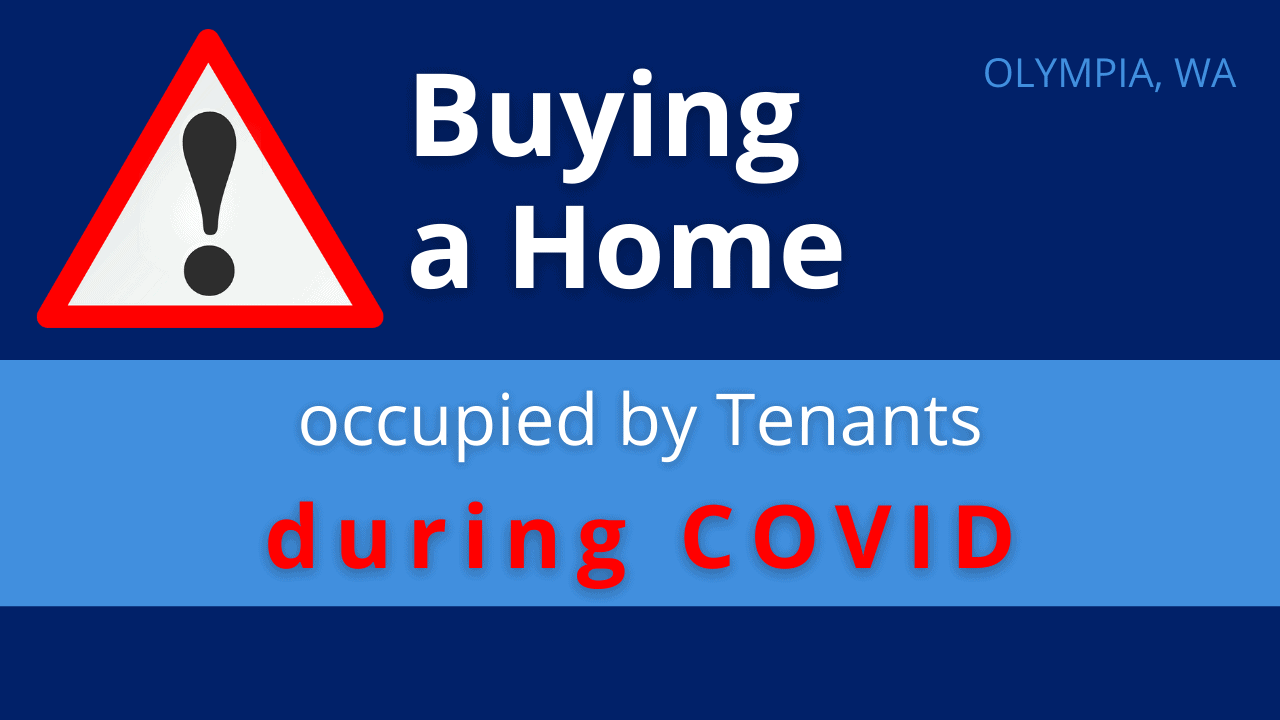This post was published on November 18, 2020.
If you are buying a home in the Olympia, WA area and it is tenant-occupied, there are risks of the tenant not moving out on the close date. If the tenant doesn’t move out, you as the new owner will either become an unintentional landlord or you’ll need to take on the eviction process. Here is what you can do to mitigate your risks when buying a home that is occupied by tenants during the COVID pandemic.
What is the Eviction Moratorium?
On February 29, 2020, Governor Inslee proclaimed a State of Emergency for Washington State and this included a proclamation where landlords were prohibited from delivering any notice of eviction to a tenant. There are exceptions, one of which, the landlord can provide a notice of eviction 60 days of the property owner’s intent to sell the property.
The moratorium on evictions was meant to protect tenants from homelessness if they could not pay their rent due to job loss and/or financial hardship from the impacts of the pandemic.
This moratorium on evictions has been extended several times since February 29th. Currently it is effective until December 31, 2020 however it is my opinion it will be extended again.
What Buyers Should Know When Buying a Home Occupied by Tenants
There are extra risks with buyers purchasing a home with tenants during the COVID pandemic specifically because of this moratorium on evictions.
Here are questions I ask the listing agent:
What is the lease agreement with the tenant? Are they month-to-month or do they have several more months on their lease?
If the tenant is month-to-month, that is ideal for a buyer who intends to occupy the property themselves (owner-occupied). Usually, this is the case with listings with tenants. But sometimes a landlord will sell with the intention that the buyer is also an investor. If the tenant has eight months left on their lease for example, the tenant has the right to remain the property for the term of their lease even after the property sells. In this case, the new owner becomes the new landlord to that tenant for the remainder of their lease.
When will the tenants move out? Have they been given the 60-days notice to vacate?
You’ll want to know if and when this was delivered to the tenant so you can track timelines. But the bad news is, serving this notice to vacate isn’t enough. This doesn’t mean the tenant must move out in 60 days – it just means the owner can START the eviction process on day sixty-one.
The worst-case scenario for buyers is if the tenant does not move out by the close date and the buyer becomes the new owner, the buyer would give the 60-day notice and then it could take weeks thereafter to manage the eviction process. This means you may not be able to move into your new property for maybe 90 days or more.
Drafting the eviction notice and assistance with the eviction process would require the assistance of a real estate attorney. (Ask me – I have several local real estate attorneys who can help.)
What are the tenant’s intentions? Are they cooperative and willing and able to move out?
Usually, when I am making the showing appointment for tenant-occupied properties, the listing agent will advise me about the tenant. It’s understandable that tenants would be upset that their landlord is listing the property for sale. Along with this, tenants are expected to cooperate with showing appointments, inspections, appraisal, etc. Some tenants are cooperative while others make their dissatisfaction well-known.
Although the answers to these questions are not going to help buyers from a legal standpoint, it’s still good to get the overall picture of the situation. Sometimes buyers will pass on a property if we find out the tenant is uncooperative. Because the next question from my buyers is:
What happens if the tenants do not move out?
If the tenants have not vacated the property by your closing date and you are now the new owner, you have two options. Either become their landlord and keep them as a tenant, or as the new owner/landlord, you can deliver the 60-day notice to vacate.
All of this costs time, money, legal fees, and unwanted stress. Not to mention that if you do become an unintentional landlord, your mortgage stipulates you are to occupy the property within thirty days and you now may be paying rent or mortgage on your current home and your new home.
Is the property in the City of Olympia?
On October 13, 2020, the Olympia City Council approved an ordinance that would protect renters who cannot pay their rent due to pandemic complications through July 1, 2021. This ordinance not only extends the current proclamation of the Governor but also makes COVID-19 an option for tenants to use as a defense against the eviction notice.
This is important to note because here in Washington state, the eviction process involves the landlord filing an unlawful detainer lawsuit against the tenant and then awaiting judgment from the court before forcing a tenant to move out.
Under the Residential Landlord-Tenant Act, tenants do not have many defenses if they decide to challenge the eviction. Under the City of Olympia’s ordinance, they have the additional COVID defense.
In this case, tenants would have to prove that their failure to pay rent was due to the pandemic such as they became ill or they lost their job.
http://olympiawa.gov/news-and-faq-s/covid-19-info/Tenant-Protections.aspx
What Can Buyers Do?
The goal for buyers with tenant-occupied properties is to get the property vacated prior to closing/before you take ownership of the property. That is the only way to be assured you can occupy and move into the property.
One way to do this is in your offer to the seller, include a contingency that closing will happen once the tenants have moved out. This isn’t a sure-fire solution and I would advise you to seek legal counsel on drafting this contingency.
Fortunately, the risks noted here are not common but all buyers who are looking at tenant-occupied properties should be cautioned on the risks and how the current proclamation from the Governor during this pandemic could affect their home purchase.
Click here for more information from the state of Washington on their Coronavirus response and the office of the Governor.

